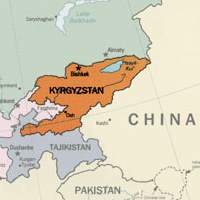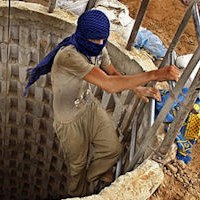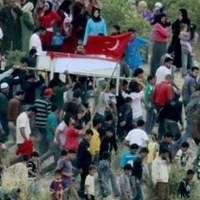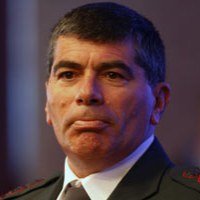![]()
Sun, Jan 02, 2010 | The Guardian: Document 1 and Document 2

Ugandan President Yoweri Museveni (R) feared Libyan leader Muammar Gaddafi (L) would attack his plane because the two had fallen out over African integration plans, according to a US diplomatic cable from 2008.
WikiLeaks: Ugandan President’s Fears of Libyan Attack
Document 1: Ugandan President Yoweri Kaguta Museveni said Libyan President Qadhafi “is a problem” for the continent and is pushing for the creation of a “United States of Africa” to be governed by one president. Museveni noted that tensions with Qadhafi are growing and as a result, and he worries that Qadhafi will attack his plane while flying over international airspace.
Document 2: Ugandan leader accuses Libya of trying to bully neighbours into an African union. President Museveni turned to his opposition to the formation of an “African Government.” He said that Libya pushed hard for support for it at the summit, but that Uganda led the charge against it.
Source: WikiLeaks
Wednesday, 18 June 2008, 22:26
S E C R E T STATE 065820
EO 12958 DECL: 06/20/2018
TAGS PREL, MARR, MOPS, UG, CG, LY, ZI
SUBJECT: A/S FRAZER’S JUNE 13 MEETING WITH UGANDAN
PRESIDENT MUSEVENI
Classified By: Assistant Secretary Frazer for Reasons 1.4 (a) and (d)1) (SBU) SUMMARY. On June 13, Assistant Secretary for African Affairs Jendayi Frazer met with Ugandan President Museveni in Fort Leavenworth, Kansas, where Museveni was attending his son’s graduation from the U.S. Army Command and General Staff College. President Museveni and A/S Frazer discussed military action against the Lord’s Resistance Army (LRA) in eastern Democratic Republic of the Congo (DRC), Libyan involvement in sub-Saharan African politics, and the political stalemate in Zimbabwe. President Museveni, A/S Frazer, and the State Department Country Officer for Uganda were present. END SUMMARY.
DRC ACTION AGAINST THE LRA
—————————
2) (S) President Museveni said the DRC has not actively attempted to end the LRA threat to the region despite numerous diplomatic agreements and regional meetings. Museveni noted that Kabila has agreed on many occasions to remove the LRA from eastern DRC, but “nothing happens” after an agreement is reached. Museveni said regional Defense Attaches recently agreed to military action against the LRA but could not develop a joint plan of action to deploy. He also noted that “there was a lack of seriousness” among some of the regional players.
3) (S) Museveni did not believe the Armed Forces of the DRC (FARDC) had the capacity or the will to carry out a successful mission against the LRA. A/S Frazer told Museveni that Kabila believed in FARDC,s capabilities, and Kabila’s continued engagement has shown the DRC’s will to conduct a successful operation. Kabila’s main fear, A/S Frazer noted, is that Ugandan People’s Defense Forces (UPDF) action on DRC soil would create political problems for Kabila in Kinshasa. Museveni acknowledged Kabila’s reservations, but noted that Kabila’s logic “didn’t make sense” since LRA, not the UPDF, is killing Congolese and destabilizing the region.
4) (C) A/S Frazer suggested the UPDF provide technical advisors to the FARDC, possibly embedding one to two UPDF soldiers in appropriate FARDC units. Museveni did not believe Kabila would accept technical or logistical assistance from the UPDF or other regional militaries. The Government of Uganda (GOU) offered the DRC a UPDF C-130 aircraft for the proposed FARDC operation but Kabila rejected it, Museveni said. Museveni did not believe technical advisors would be helpful because the FARDC needed combat personnel, not technical support.
5) (C) A/S Frazer said Kabila informed her that he plans to send two FARDC battalions to deploy against the LRA by the end of the month. Museveni indicated he is open to a joint UPDF/FARDC operation if Kabila agrees. A/S affirmed that President Bush remains very interested in ending the LRA threat and would welcome Museveni,s thoughts on the LRA threat to the region.
LIBYA
—–
6) (S) President Museveni said Libyan President Qadhafi “is a problem” for the continent and is pushing for the creation of a “United States of Africa” to be governed by one president. Museveni thought Qadhafi’s plan is neither feasible nor desirable, given cultural and linguistic differences across the continent. Rather than the development of a unitary African state, Museveni said he is pushing Qadhafi and other African leaders to develop regional political federations and markets that support common objectives. Museveni indicated to A/S Frazer that Qadhafi continues to “intimidate” small African countries through bribes and other pressure. As a result of Libya’s actions, small West African countries have been afraid to participate fully or speak out during international meetings at the United Nations, African Union, and other forums.
7) (S) Museveni noted that tensions with Qadhafi are growing and as a result, and he worries that Qadhafi will attack his plane while flying over international airspace. Museveni requested that the USG and GOU coordinate to provide additional air radar information when he flies over international waters.
ZIMBABWE
——–
8) (C) Museveni told A/S Frazer that he spoke to Zimbabwean President Mugabe by telephone after the first round of elections. During his call, Mugabe told Museveni he was confident he would win in the second round of elections. Mugabe told Museveni he did not want election monitors from countries that were “hostile” to Zimbabwe, but wouldn’t mind observers from other countries. A/S Frazer thought thousands of monitors were necessary, especially in rural areas, to encourage people to vote. A/S Frazer advised Museveni that she would ask the U.S. Ambassador in Zimbabwe how many elections monitors he believes are needed.
9) (C) Museveni thought Zimbabwe’s faltering economy and Mugabe’s poor understanding of the private sector were at the root of Zimbabwe’s political problems. He said a discussion of the economy would provide an entry point to tell Mugabe that he has failed and is embarrassing liberation leaders. He noted that Mugabe is unwilling to take calls from most African leaders saying they are not his age-mates.
10. (U) Tripoli minimize considered.
RICE
Source: WikiLeaks
Friday, 14 September 2007, 09:01
S E C R E T SECTION 01 OF 04 KAMPALA 001449
SIPDIS
SIPDIS
EO 12958 DECL: 06/18/17
TAGS PGOV, PREL, UG, SU, CG, SO
SUBJECT: UGANDA: A/S FRAZER DISCUSSES LRA, CONGO, AND
SOMALIA WITH PRESIDENT MUSEVENI
Classified By: Ambassador Steven Browning for reasons 1.4 (b) and (d).1. (C) Summary: Africa Bureau Assistant Secretary Jendayi Frazer met with Ugandan President Yoweri Museveni on September 5 to discuss current developments in the negotiations with the Lord,s Resistance Army (LRA), developments in eastern Congo, and stabilizing Somalia. President Museveni, similarly to U.N. Special Envoy for LRA-Affected Areas Chissano, said that there needed to be “irreversible progress” in the peace process by the end of January 2008. Museveni said he would press Congolese President Joseph Kabila to take action against the “negative forces” in eastern Congo. On Somalia, Museveni pushed for tough action against Eritrea and pressure on Transitional Federal Government President Yusuf to be more inclusive and announce a timeline for the transition to democracy. Museveni also explained his vision of African unity in contrast to Libya,s approach as revealed at the AU Summit in Accra. End Summary.
– –
LRA
– –
2. (C) Africa Bureau Assistant Secretary Jendayi Frazer traveled to Uganda on September 5 and met with President Yoweri Museveni and northern Ugandan officials. She was accompanied by Ambassador Browning, Senior Advisor for Conflict Resolution Tim Shortley, and the P/E Chief (notetaker). A/S Frazer opened the meeting by introducing Tim Shortley as her new Senior Advisor on Conflict Resolution who will focus on LRA and eastern Congo. She then asked President Museveni for his views on the status of the negotiations with the LRA. Museveni expressed pessimism about the peace process, describing it as a &circus8 and that the LRA was being &pampered.8 President Museveni told Frazer that he had discussed the process with U.N. Special Envoy for LRA-Affected Areas Joachim Chissano during Chissano’s recent visit to Kampala. He agreed with Chissano to give the peace talks until the end of January unless there were signs of &irreversible progress.8 Museveni said he would raise the LRA in his meeting with Congolese President Joseph Kabila in Arusha on September 8. Museveni said he would urge Kabila to take action now against the LRA. He would advise Kabila to push the LRA out of Congo and into the assembly area in southern Sudan to stop the LRA from &gallivanting around Garamba.8 This type of action could demonstrate Kabila,s commitment to enforcing the Cessation of Hostilities Agreement, other regional pacts, and international resolutions.
3. (C) Museveni complained that the LRA was using the peace talks to reorganize and described Joseph Kony as a &trickster.8 In Museveni,s view, the LRA,s complaints that the International Criminal Court (ICC) warrants should be dropped prior to his coming out of the bush were not valid if a national legal process was underway to deal with the issue of accountability. The ICC was only a problem for Kony if he did not want peace. Museveni was adamant that Kony should not be rewarded with a suspension or dropping of the ICC indictments before he agreed to peace. Guarantees could be built into the implementation of a peace agreement to address his fears.
4. (C) Senior Advisor Shortley asked Museveni for his views on how Kony would be handled if he agreed to a deal. Museveni described his provision of protection, livelihood, and homes for Kony,s mother (and now deceased father) since 1994. Museveni was flexible on Kony,s future, saying that the LRA leader could live anywhere in Uganda where he had not committed atrocities. Museveni agreed with Shortley that the resumption of the peace process could slip into October, which reaffirmed the President,s cynicism about the negotiations. Despite his misgivings about the &circus at Juba,8 Museveni was willing to allow the process to continue until the end of January.
5. (C) Museveni dismissed the demands for political power by the diaspora that backed the LRA. He argued that northern Ugandans were represented at all levels of government. In fact, Museveni pointed out that northerners elected opposition party members to represent them. The Ugandan Government would not accept &rewarding8 the disaffected diaspora and &terrorists8 through the peace process. Museveni argued that if regime critics such as former U.N. Special Representative for Children in Armed Conflict Olara Otunnu wanted to return to Uganda to run for office, they could do so. If northern Uganda was &thirsty8 to have Otunnu represent it, then a member of Parliament should vacate his seat for Otunnu to compete. He elaborated with the example of former President Tito Okello,s son, Henry
KAMPALA 00001449 002 OF 004
Okello Oryem, who won election to parliament in Kitgum. After he lost his parliamentary seat, Museveni appointed Oryem as Minister of State for International Relations. (Note: Oryem is the deputy leader of the GOU negotiating team. End Note.)
6. (C) The President also stated his belief that Kony was a proxy of the Khartoum Government. Museveni proudly pointed out that Uganda had defeated Khartoum through its support for the Sudan Peoples, Liberation Army (SPLA) even though, he joked, the United States took credit for finalizing the Comprehensive Peace Agreement (CPA).
7. (C) Shortley expressed the U.S. Government,s hope that with increasing stability in northern Uganda, the Peace, Recovery, and Development Plan (PRDP) could be formally launched in order to attract more attention from potential donors. Museveni said he wanted to correct the common misconception that peace in the north was the result of the negotiations. According to Museveni, the current stability was not the result of the peace talks but from Kony being pushed into Congo. He said that the GOU had defeated the LRA in northern Uganda and Southern Sudan. For Kony, the peace process was a &relief8 from military pressure, according to the President. He also stated that there were many prominent Ugandans who were LRA collaborators who feared exposure and now viewed the peace talks as a way to save Kony and themselves.
8. (C) A/S Frazer agreed with Museveni,s assessment of the LRA,s intentions and the need to secure Kabila,s cooperation. She said it was encouraging that Museveni was meeting with Kabila. She told Museveni that the U.S. wanted to work together on potential contingenices, and in particular, help Uganda transform the situation on the ground. Meeting the needs of the PRDP would be an extremely important way of supporting this transformation. Museveni said the cabinet had prepared a paper on the PRDP, which included a 14-point plan, with projects for industrializing northern Uganda.
9. (C) Museveni stated that &behind all of this is Sudan, Sudan, Sudan, Sudan.8 He said that even if the Khartoum Government could not supply the LRA at previous levels, he believed it was in constant touch with the LRA and smuggling supplies. Museveni said that the Uganda military was now more capable to address the LRA problem. A/S Frazer asked if Museveni had communicated his timeframe for the peace talks with the LRA. Museveni said no, but Chissano may have, although he was not sure. Museveni downplayed the role of local politicians in the process. He described his own Government,s parallel track as part of the foolery and lamented that fools have a lot of audiences. He pointed out that even international conservation groups have contacted the LRA to check on the white rhinos and other wildlife in the park. Museveni said that he himself participated in the “foolery” and has taken Vincent Otti,s telephone calls and sent the LRA cows for Christmas. The President claimed that the GOU had infiltrated the LRA and knew what its members were talking about.
– – – – – – –
EASTERN CONGO
– – – – – – –
10. (C) A/S Frazer asked Museveni if he could confirm media reports that Kabila had used gunships in eastern Congo. Museveni did not know but would check. She also described U.S. efforts to calm both Kabila and Rwandan President Kagame, promote improved diplomatic relations, and foster inter-communal dialogue. A/S Frazer also highlighted U.S. efforts to facilitate dialogue through the Tripartite Plus process. Museveni said that Foreign Minister Kutesa had delivered several messages to Kabila. Kustesa was surprised that Kabila had taken the problem of the negative forces in eastern Congo casually. Museveni said that Uganda was begging Kabila to do something about Kony, the Allied Democratic Forces, and the FDLR. Uganda made the argument that it is a state obligation for Congo to take action, not a situation in which Kabila would be doing Museveni a favor. Museveni lamented that there was little to show on the security front since MONUC,s inception. He attributed this to lack of attention by the five permanent members of the U.N. Security Council and MONUC,s current leadership. Kabila feels he has the protection of the &big boys8, according to Museveni. However, Museveni said that the UNSC was a better venue for addressing the problem than the U.N. General Assembly. He gave the example of Ghana, which had previously held strong positions on the LRA, Congo, and Sudan, and now had weakened its stance after becoming chair of the African Union.
KAMPALA 00001449 003 OF 004
11. (C) Museveni sees two ways in which Congo could solve the LRA problem. First, allow joint operations with Uganda. Second, Congo could find a third party, such as France or Angola to help. Museveni was flexible on how it was done and wanted Congo to understand that it had a number of options. For Uganda, it would be preferable if the U.N. cleared the border areas of negative forces, which would then move deeper into Congo. Re-establishing border control would lessen the threat of the negative forces to Uganda and Rwanda. In Museveni’s view, once the negative forces moved deeper into Congo, then Kabila could take as long as he wanted to deal with them.
– – – –
SOMALIA
– – – –
12. (C) On Somalia, Museveni raised concerns about Transitional Federal Government President Yusuf,s non-inclusivity and the slowness in the building of a national army. He emphasized the importance of establishing a timetable for elections. Museveni felt that the Ugandan military had a good relationship with Somali civilians. Improvement of the infrastructure and economy were also essential to stabilizing the country. Uganda had named an ambassador to Somalia with 36 years of experience and who was an economist. Museveni asked him to prepare a paper on formalizing Somalia,s informal economy.
13. (C) Another problem in Somalia was Eritrea, according to Museveni. He described his visit with President Isaias Aforkwi in March and said that although the two promised to talk, they had not communicated since. Museveni said President Isaias was preoccupied with trying to unseat Meles. That was all Isaias talked about, yet Museveni observed that Meles did not appear to be in any less control of Ethiopia despite Isaias, actions. Museveni told A/S Frazer that Isaias needed to be talked to by the members of the U.N. Security Council who carry a big stick. Museveni claimed that Eritrea continued to infiltrate weapons into Somalia and said that Isaias needed to be intimidated. Museveni argued that the UNSC should consider a blockade or sanctions if Eritrea does not listen. If Isaias was controlled and Somali groups cut off from him, the situation could stabilize. A/S Frazer told Museveni that the U.S. was considering options, ranging from designation as harboring terrorists to drying up financial support, against Eritrea. The U.S. was trying to persuade the Somali parliamentarians in Eritrea to leave before they associated with terrorist elements who sought refuge there. This would be important to establishing credentials as a legitimate opposition. She asked if Uganda would be willing to accept those parliamentarians that chose to leave Eritrea. Museveni agreed and explained that the wife of former warlord Aideed was still living in Uganda. Museveni,s only condition was that TFG President Yusuf must have no objection. A/S Frazer said that any such arrangement would be worked on in consultation with key players in the political process.
– – – – – – – – – – – – – – – –
AFRICAN UNION AND OTHER ISSUES
– – – – – – – – – – – – – – – –
14. (C) Museveni turned to his opposition to the formation of an “African Government.” He said that Libya pushed hard for support for it at the summit, but that Uganda led the charge against it. Museveni believes economic integration would be possible, but political integration would be difficult as each country has different foreign and internal policies and national identities. Uganda also has a basic disagreement with Libya over Sudan. Museveni accused Libya of pushing an Arab agenda on the continent.
15. (S) In a tte–tte with A/S Frazer, Museveni went further to express concern about Libya,s intentions and methods of influencing &weak8 West African states. Museveni said Qadhafi is trying to buy them off or intimidate them by destabilizing their countries unless they agree with union. He also expressed disappointment that President Mbeki has not effectively offered an alternative vision to Qadhafi,s approach to union government. Museveni said he and Mbeki are working together to counter Libya,s vision of unity.
– – – – –
COMMENT
– – – – –
16. (C) Museveni demonstrated flexibility on how LRA leader Joseph Kony might be handled. Though pessimistic about
KAMPALA 00001449 004 OF 004
whether the peace talks would succeed, Museveni was willing to let the peace process move forward, but not without end. He welcomed the addition of Senior Advisor Shortley to support U.S. efforts. Press coverage of A/S Frazer’s visit was extensive.
16. (U) A/S Frazer cleared this message.
BROWNING



 RSS
RSS











#WikiLeaks: #Ugandan President's Fears of #Libyan Attack | #Uganda #Libya #Gaddafi http://j.mp/gbMC6K
RT @CrethiPlethi: #WikiLeaks: #Ugandan President's Fears of #Libyan Attack | #Uganda #Libya #Gaddafi http://j.mp/gbMC6K